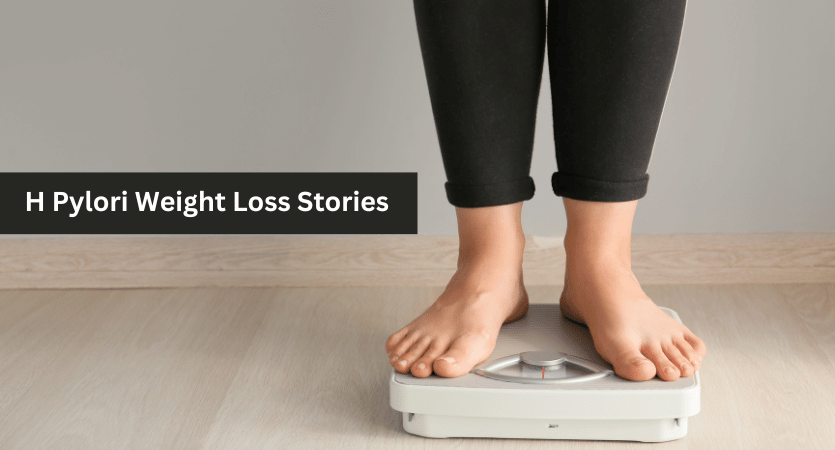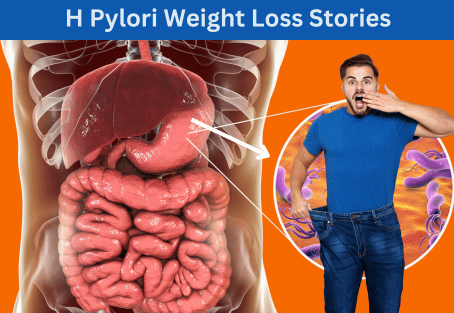Many individuals report weight loss after an H. Pylori infection, attributing it to the bacterium’s effects on the gut. These stories often detail symptoms like appetite loss and stomach pain leading to reduced food intake.
Helicobacter pylori (H. Pylori) is a type of bacteria commonly associated with stomach ulcers and chronic gastritis. It resides in the digestive tracts of about half the world’s population, often without causing noticeable symptoms. For some, however, H. Pylori can disrupt the normal functioning of the stomach, potentially leading to symptoms that affect eating habits and weight.
Personal accounts of weight loss related to H. Pylori usually describe a decrease in appetite and an increase in discomfort after eating. Medical intervention typically involves a prescribed course of antibiotics and acid-reducing medication to eradicate the infection. Subsequent recovery can involve a gradual return to normal weight as the digestive system heals and appetite returns. These personal stories provide insight into the potential impact of H. Pylori beyond common gastrointestinal conditions.
Credit: www.healthdigest.com
Understanding H Pylori Infection
An H pylori infection can be a silent disturber, affecting not only your digestive system but also potentially your weight. This section delves into what H pylori is, the symptoms it may cause, and the intriguing connection between the bacterium and body weight variations. Let’s uncover the stories of individuals who have experienced weight loss with H pylori and seek to understand the dynamics of this complex relationship.
What Is H Pylori?
Helicobacter pylori (H pylori) is a type of bacteria that can inhabit the stomach lining. It is incredibly common worldwide and is known for its ability to survive in the harsh acidic environment of the stomach. If left untreated, H pylori can lead to chronic inflammation, ulcers, and may even increase the risk of developing certain types of gastric cancer.
Symptoms Of H Pylori Infection
Many individuals with H pylori infection may not exhibit any signs. However, those who do may experience symptoms like:
- Abdominal pain or discomfort, typically in the stomach area
- Bloating and burping
- Loss of appetite
- Unintentional weight loss
- Nausea or vomiting, sometimes with blood
- Black, tarry stools or blood in stools, indicative of bleeding in the stomach
It’s critical for individuals presenting these symptoms to consult their healthcare provider for diagnosis and treatment.
Link Between H Pylori Weight Loss Stories
The relationship between H pylori and weight changes is complex. Some individuals may experience weight loss due to decreased appetite, nausea, and stomach pain associated with the infection. The bacteria can affect stomach hormones that regulate appetite, leading to altered food intake and body weight. Conversely, some people might gain weight after eradicating H pylori because the relief of symptoms improves appetite and food intake. Studies continue to explore this connection, offering hope and understanding for those affected.
Personal Weight Loss Journeys
When it comes to dramatic lifestyle changes, nothing is more personal than weight loss stories. In the maze of advice on diet and exercise, an unexpected factor might turn the tables – the existence of H. pylori bacteria. Hear firsthand from individuals who found that their weight loss journeys were intertwined with the battle against H. pylori. Each story unveils unique challenges and triumphs that transformed their lives.
Real-life Experiences Of Individuals With H Pylori
Many weight loss paths have become surprisingly clearer after understanding the role of H. pylori in their lives. This bacteria, often dwelling unnoticed, can significantly affect digestive health and metabolism. Below, real-life testimonials highlight the profound effect of H. pylori on their weight management efforts:
- Anna’s Discovery: After battling unexplained weight gain, a diagnosis of H. pylori led her to a treatment that not only improved her digestive health but also aided in shedding those extra pounds.
- David’s Turnaround: A fitness enthusiast, David hit a plateau until his unexpected diagnosis. The eradication of H. pylori brought back his metabolism’s efficiency, assisting in muscle gain and fat loss.
- Lisa’s Relief: Suffering from bloating and weight fluctuation, Lisa’s journey with H. pylori treatment also uncovered a sensitivity to certain foods, which was pivotal in her successful weight loss.
Impact Of H Pylori Treatment On Weight Loss
Tackling H. pylori can be a turning point for weight loss. The treatment involves a combination of antibiotics and acid-suppressing medications, which can reset the gut environment. This shift can potentially influence weight by:
- Improving gut motility and digestion.
- Reducing inflammation and allowing nutrient absorption.
- Alleviating appetite distortion caused by the bacteria.
These biological changes provide valuable insights into the connectivity between gut health and weight management, emphasizing the importance of a holistic approach to weight loss strategies.
Success Stories And Challenges Faced
Every success story is peppered with challenges, and the path to weight loss while dealing with H. pylori is no different. Here are some common themes encountered:
| Successes | Challenges |
| Effective elimination of bacteria after treatment. | Experiencing side effects from antibiotics. |
| Improved symptoms and digestive health. | Difficulty in maintaining dietary changes post-treatment. |
| Weight loss and stabilized metabolism. | Fear of possible reinfection and weight rebound. |
These narratives not only enlighten us about the hurdles but also celebrate the resilience and determination individuals exhibit in the face of health adversity. Their stories become a beacon, encouraging and guiding others on similar journeys.
Medical Insights And Studies
Helicobacter pylori (H. pylori) is a type of bacteria commonly known for causing ulcers and chronic gastritis. Its impact on gastrointestinal health is well documented, but recent studies have begun to unveil its unexpected role in body weight regulation. Many individuals share anecdotal accounts of weight fluctuations following H. pylori infection or after its eradication. Delving into the science provides us with intriguing insights into how this bacterium may influence metabolism and weight.
Scholars have invested considerable effort to unravel the complex interactions between H. pylori and its host’s metabolism. Evidence suggests that this bacterium can disrupt the balance of the gut microbiota and affect the secretion of gastric hormones that regulate appetite and metabolism.
- Ghrelin levels: H. pylori infection has been linked to increased levels of ghrelin, the “hunger hormone”, which might affect body weight.
- Leptin sensitivity: Altered levels of leptin, a hormone responsible for satiety signals, have also been noted in some cases.
Researchers are seeking to understand how these hormonal changes can lead to variations in body weight and overall energy homeostasis.
The eradication of H. pylori is a recommended treatment for those suffering from its associated digestive maladies. An interesting trend has emerged with patients often reporting weight gain post-eradication. Studies have endeavored to quantify this phenomenon.
| Study | Weight Change Observed |
| Effects on Ghrelin and Leptin | Normalization of hormone levels, leading to increased appetite and potential weight gain |
| Impact on Gut Microbiota | Changes in composition, influencing nutrient absorption and energy expenditure |
These findings support a potential link between H. pylori treatment and adjustments in body weight, highlighting the need for further in-depth investigation.
Health professionals and researchers hold diverse opinions regarding H. pylori’s impact on weight loss. While a direct cause-and-effect relationship is hard to establish, the delicate interplay between the bacterium and its effects on host metabolism is undeniable. Experts assert the necessity for a personalized approach when considering the implications of H. pylori on an individual’s weight, particularly in the context of eradication therapy.
Consensus amongst practitioners is that any change in weight following H. pylori eradication is likely multifactorial, with factors including:
- Individual variations in metabolic responses
- Pre-existing gastrointestinal conditions
- The patient’s dietary habits post-treatment
Attention to such details ensures a comprehensive understanding of H. pylori’s role in weight management and informs therapeutic strategies.
Healthy Lifestyle Choices Post-treatment
For many individuals battling H Pylori, a weight loss journey can follow after successful treatment. Once the treatment subsides the infection, it ignites a new chapter focused on restoring health and vitality. Embracing healthy lifestyle choices becomes pivotal to not only maintain a healthy weight but also to ensure overall well-being and prevent the recurrence of issues.
Importance Of Diet And Exercise After H Pylori Eradication
The eradication of H Pylori often leaves patients with a profound sense of relief. However, it’s essential to understand that this medical victory is just the beginning. The aftermath of treatment necessitates a commitment to diet and exercise. A well-planned diet and consistent exercise routine can enhance gut health, help in stabilizing weight, and improve the body’s resilience to potential reinfections.
- Balanced meals: Eating a variety of nutrient-dense foods is crucial.
- Regular physical activity: Establishing a routine encourages metabolic health and aids digestion.
- Hydration: Sufficient water intake is vital for flushing toxins and supporting gut flora.
Nutritional Recommendations For Maintaining A Healthy Weight
To maintain a healthy weight post-H Pylori, one must focus on nutrition that aligns with your body’s new requirements. Nutritional guidelines often suggest a diet rich in fiber, lean proteins, and probiotics, which support the digestive system and offer a sense of fullness.
| Food Group | Benefits | Recommended Sources |
| Fiber | Improves digestion and prolongs satiety | Whole grains, fruits, vegetables, legumes |
| Lean Proteins | Supports muscle repair and metabolic rate | Chicken, fish, tofu, legumes |
| Probiotics | Enhances gut flora balance | Yogurt, kefir, kimchi, sauerkraut |
Alongside controlled portions, these foods will help in keeping a healthy weight management routine.
Building A Sustainable Lifestyle Post-h Pylori Treatment

Creating a sustainable lifestyle is about more than occasional healthy choices; it’s about cultivating habits that can withstand the test of time. This involves:
- Setting realistic goals: Aim for attainable health objectives.
- Meal planning: Prepare a weekly menu to stay on track with nutrient-rich foods.
- Consistent exercise: Find physical activities that are enjoyable and fit into your schedule.
- Mindful eating: Pay attention to hunger cues and savor meals without distractions.
- Stress management: Incorporate relaxation techniques to help mitigate stress-induced overeating.
In this way, post-treatment life can be not only about weight management but also about cultivating wellness and harnessing health long-term.
Embracing The Journey After H Pylori Treatment
Post-treatment of H Pylori, individuals often experience significant shifts in their health and well-being. Embracing these changes can pave the way for a healthier lifestyle and sustainable weight loss. Recognizing that weight loss is not just about shedding pounds, but also about healing the body and nurturing the mind, plays an integral role in one’s overall recovery.
Inspiring Others With Personal Stories Of Resilience
- Sharing success stories encourages others facing similar challenges.
- These narratives foster a community of support and encouragement.
- Resilience manifests as a beacon of hope for many struggling with post-H Pylori weight challenges.
Cultivating A Positive Narrative About Weight Loss Post-h Pylori
It’s essential to build a positive narrative around weight loss after H Pylori. Celebrating small victories and setting realistic goals can create an empowering mindset. This approach reshapes a person’s weight loss experience from a series of obstacles into a journey of self-discovery and achievement.
Frequently Asked Questions – FAQ
Can H. Pylori Infection Cause Weight Loss?
H. pylori infections can lead to weight loss, often due to decreased appetite and gastrointestinal discomfort. Patients might experience symptoms like nausea and bloating, which can reduce the desire to eat and lead to unintentional weight loss.
What Are The Symptoms Of H. Pylori Infection?
Common symptoms of H. pylori infection include abdominal pain, nausea, bloating, frequent burping, and loss of appetite. Some individuals may also experience weight loss and peptic ulcers due to the bacterial infection’s impact on the stomach lining.
How Is H. Pylori Infection Diagnosed?
H. pylori infections are typically diagnosed using breath tests, blood tests, stool tests, or endoscopy. Doctors select a diagnostic method based on symptoms, medical history, and availability of medical facilities.
Can Treating H. Pylori Lead To Weight Gain?
Treating H. pylori can result in weight gain as the infection is eradicated. The body heals from inflammation and ulcers, potentially restoring normal digestion and appetite, which might have been previously impaired.
Conclusion
Understanding the journey with H. Pylori can be enlightening. Many have shared their experiences of weight fluctuation tied to this bacteria. These personal accounts offer hope and insight to those facing similar health battles. Remember, every story is unique, and consulting a healthcare professional is key.
Take heart in the shared successes and consider the steps that led others to regain their health and wellness.




Leave a Reply